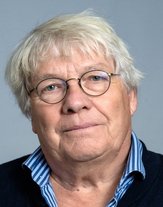Magnus Ingelman-Sundberg

Affiliation 1: Karolinska Institute – Department of Physiology and Pharmacology
Position: Professor of Molecular Toxicology and Section Head of Pharmacogenetics
Organizational unit: Department of Physiology and Pharmacology
Address: Solna vägen 9/B5, 17165 Solna
Phone: +46-(0)8-524 877 35
Email: magnus.ingelman-sundberg@ki.se
Affiliation 2: University of Belgrade – Faculty of Pharmacy
Position: Guest Professor
Organizational unit: Department of Pharmacology
Address: Vojvode Stepe 450, 11221 Belgrade, Serbia
Room: B302
Email: magnus.ingelman-sundberg@ki.se
Magnus Ingelman-Sundberg is a Swedish citizen born in 1951 in Danderyd. He received his Master's Degree from the Royal Institute of Technology in Stockholm in 1975. Ingelman-Sundberg received his PhD in 1977 on the enzymatic characterization of hepatic steroid conjugation reactions. In the following years, he worked on the original identification and molecular characterization of ethanol-inducible cytochrome P450 (CYP)2E1, which is of key toxicological importance in alcohol-related liver disease. This was soon followed by an associate professor position in physiological chemistry. During these early years, and while he established his own research group, he also took a Bachelor's Degree in medicine at the Karolinska Institute in 1978. After several years as acting professor at the Medical Biochemistry and Biophysics Department, he was appointed full professor of molecular toxicology at the KI in 1996. Presently, he is in charge of the Section of Pharmacogenetics that belongs to the Department of Physiology and Pharmacology at the Karolinska Institute, where he is also the vice-chairman.
Magnus Ingelman-Sundberg has made a fundamental contribution to personalized medicine and individualized drug treatment. He has published more than 490 original papers, 31 024 citations (45 519 in Google Scholar), and an h-factor of 91 (ISI) or 117 (Google Scholar). He was a member of The Nobel Assembly at Karolinska Institutet 2008-2018.
He is a member of Editorial Advisory Boards of e.g. Trends in Pharmacological Sciences (Editorial Board), Pharmacogenetics and Genomics, Pharmacogenomics, Drug Metabolism Reviews, Drug Metabolism and Disposition. Chairman of the Microsomes and Drug Oxidation International Advisory Committee, mdo.ki.se.
Magnus Ingelman-Sundberg is ranked as the one of the world's most cited authors within the category Pharmacology 2014-2016 (http://isihighlycited.com/). He is categorized by Thomson Reuters as one of the world’s most influential scientific minds (http://sciencewatch.com/sites/sw/files/sw-article/media/worlds-most-influential-scientific-minds-2014.pdf) based on citations from highly ranked journals.
- van der Lee M, Allard WG, Vossen RHAM, Baak-Pablo RF, Menafra R, Deiman BALM, Deenen MJ, Neven P, Johansson I, Gastaldello S, Ingelman-Sundberg M, Guchelaar HJ, Swen JJ, Anvar SY. Toward predicting CYP2D6-mediated variable drug response from CYP2D6 gene sequencing data. Sci Transl Med. 2021 Jul 21;13(603):eabf3637.
- Jukić MM, Smith RL, Molden E, Ingelman-Sundberg M. Evaluation of the CYP2D6 Haplotype Activity Scores Based on Metabolic Ratios of 4,700 Patients Treated With Three Different CYP2D6 Substrates. Clin Pharmacol Ther. 2021 Mar 31. doi: 10.1002/cpt.2246.
- Riede J, Wollmann BM, Molden E, Ingelman-Sundberg M. Primary human hepatocyte spheroids as an in vitro tool for investigating drug compounds with low clearance. Drug Metab Dispos. 2021 Jun 1:DMD-AR-2020-000340.
- Milosavljevic F, Bukvic N, Pavlovic Z, Miljevic C, Pešic V, Molden E, Ingelman-Sundberg M, Leucht S, Jukic MM. Association of CYP2C19 and CYP2D6 Poor and Intermediate Metabolizer Status With Antidepressant and Antipsychotic Exposure: A Systematic Review and Meta-analysis. JAMA Psychiatry. 2021 Mar 1;78(3):270-280.
- Oliva-Vilarnau N, Vorrink SU, Ingelman-Sundberg M, Lauschke VM. A 3D Cell Culture Model Identifies Wnt/β-Catenin Mediated Inhibition of p53 as a Critical Step during Human Hepatocyte Regeneration. Adv Sci (Weinh) 2020 Aug;7(15):2000248.
- Hurrell T, Kastrinou-Lampou V, Fardellas A, Hendriks DFG, Nordling Å, Johansson I, Baze A, Parmentier C, Richert L, Ingelman-Sundberg M. Human Liver Spheroids as a Model to Study Aetiology and Treatment of Hepatic Fibrosis. Cells. 2020 Apr 14;9(4):964.
- Jukic MM, Smith RL, Haslemo T, Molden E, Ingelman-Sundberg M. Effect of CYP2D6 genotype on exposure and efficacy of risperidone and aripiprazole: a retrospective, cohort study. Lancet Psychiatry 2019 May;6(5):418-426.
- Lauschke VM, Barragan I, Ingelman-Sundberg M. Pharmacoepigenetics and Toxicoepigenetics: Novel Mechanistic Insights and Therapeutic Opportunities. Annu. Rev. Pharmacol. Toxicol. 2018 01;58():161-185
- Lauschke VM, Vorrink SU, Moro SM, Rezayee F, Nordling Å, Hendriks DF, Bell CC, Sison-Young R, Park BK, Goldring CE, Ellis E, Johansson I, Mkrtchian S, Andersson TB, Ingelman-Sundberg M. Massive rearrangements of cellular MicroRNA signatures are key drivers of hepatocyte dedifferentiation. Hepatology 2016 11;64(5):1743-1756.
- Ingelman-Sundberg M. Genetic polymorphisms of cytochrome P450 2D6 (CYP2D6): clinical consequences, evolutionary aspects and functional diversity. Pharmacogenomics J. 2005;5(1):6-13. doi: 10.1038/sj.tpj.6500285.